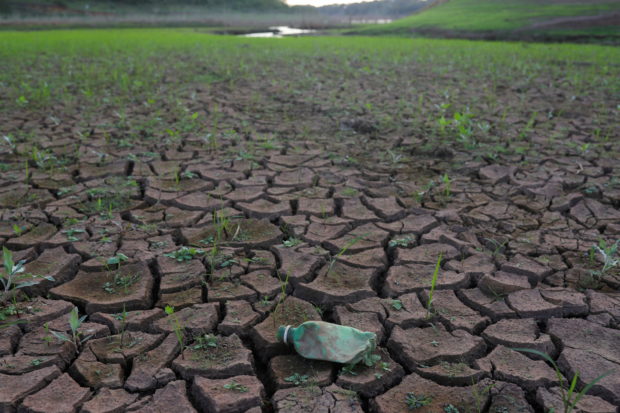Climate on track to devastate world’s poorest economies–study

A crushed bottle is seen on the dry ground of the Jaguari dam, which is part of the Cantareira reservoir system, during a drought in Joanopolis, near Sao Paulo, Brazil, October 8, 2021. REUTERS FILE PHOTO
GLASGOW — The 65 most vulnerable nations will see GDP drop 20 percent on average by 2050 and 64 percent by 2100 if the world heats up 2.9 degrees Celsius, according to a report released Monday at the COP26 climate talks in Glasgow.
Even if global temperature rises are capped at 1.5C, in keeping with the most ambitious Paris Agreement goal, the same countries would take a GDP hit of 13 percent by 2050 and 33 percent by the end of the century, the study commissioned by Christian Aid said.
To date, Earth’s average surface temperature has risen 1.1C compared to late 19th-century levels.
The findings from Christian Aid show that more than a third of the world’s nations urgently need help to build up resilience if their economies are to withstand the onslaught of heatwaves, drought, floods and storms made more intense and deadly by global warming.
“The ability of countries in the Global South to sustainably develop is seriously jeopardized,” said lead author Marina Andrijevic from Humboldt University in Berlin.
Article continues after this advertisement“Policy choices that we make right now are crucial for preventing further damage.”
Article continues after this advertisementEight of the top 10 most affected countries are in Africa, with two in South America.
All 10 face GDP damage of more than 70 percent by 2100 under our current climate policy trajectory, and 40 percent even if global warming is capped at 1.5C.
The country facing the worst GDP loss is Sudan, which in September was left reeling from heavy rains and flash floods affecting more than 300,000 people.
The country would see a GDP reduction of 32 percent by 2050, and 84 percent by 2100 compared with if there was no climate change.
The countries covered by the report make up two key negotiating blocs at the UN climate talks, which run through Friday: the Least Developed Countries (LDCs) and Alliance of Small Island States (AOSIS).
Small island states are especially vulnerable to storm surges made worse by rising seas.
The study does not take into account adaptation measures, which could potentially alleviate some of the damage.
To date, rich governments have committed only modest sums to help poor countries adapt to climate impacts.
“Africa has the done the least to cause climate change yet this report shows it will face the most severe consequences. That is deeply unjust,” said Mohamed Adow, director of Nairobi-based climate and energy think tank Power Shift Africa.